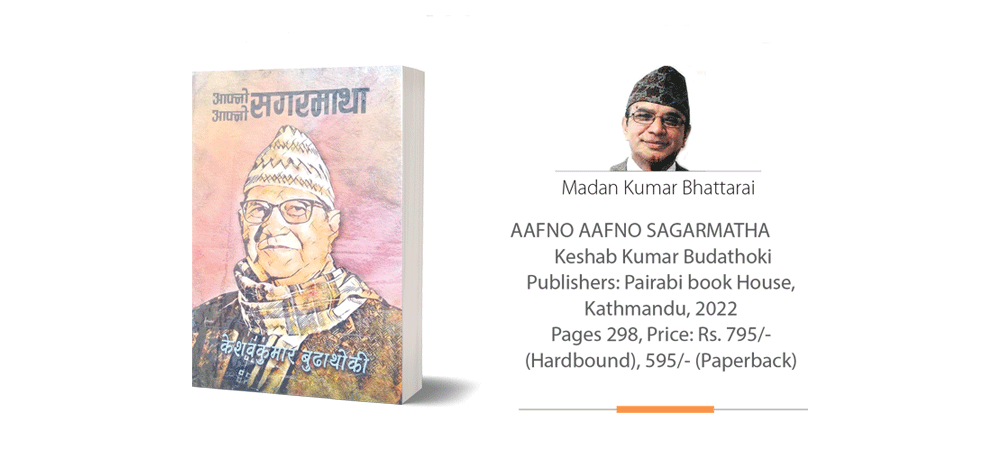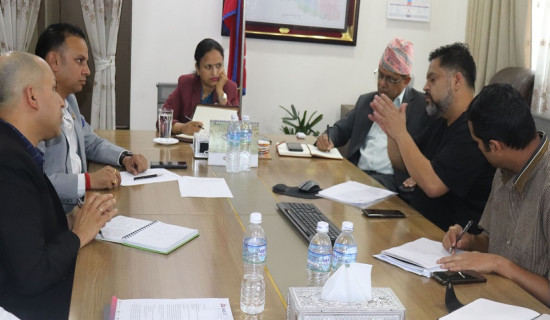- Friday, 19 April 2024
Frank Reflection Of A Self-Declared Egoist
Keshab Kumar Budathoki, a dyed-in-the-wool politician with a cerebral image, has published an interesting book entitled AAFNO – AAFNO SAGARMATHA (Aatmasamsmaran). This can be roughly translated as One's Own Sagarmatha (memoirs). Sagarmatha, the world's tallest peak in the Nepal Himalayas, seems to have been chosen as a metaphor to indicate the limit and extent of one's growth, ambition or achievement.
The beauty of the work is enhanced by the simple and smooth flow of language depicting the unique style and approach of the writer with the appropriate editorial craftsmanship of litterateur Krishna Dharabasi.
There are three commentaries apart from the preface on behalf of publishers. Dharabasi's commentary is especially noteworthy in the sense that he not only has the pulse of the writer but also makes interesting observations both on new publications and recent trends in writing autobiographies and memoirs.
Dharbasi puts rather negative memoirs by politicians and civil servants in one basket, calling them vain attempts to what he says hide their flaws and prove innocence, an endeavour to turn "brass into gold." The editor makes a prognosis that this autobiography not only "deconstructs" prevailing impressions of Budathoki but also proves "surprisingly popular."
Divided into three Parts, the Conclusion and Photo Gallery, the first part of the book depicts the family history, childhood days and education dissected threadbare in 13 chapters covering 96 pages. The second part dealing with political life is understandably the biggest segment of the book and occupies 126 pages and is divided into 24 chapters.
The third and last part with no sub-title but possibly an extension of the second part is further dealt with in 10 chapters. Coda is quite short with only 5 pages but has an important message that may be useful to deal with first. Making a reflection of his entire life marked by fire and fury, the author makes three pertinent observations.
These include learning virtues of commitment and restraint from his education at North Point as the roommate of royal family members including the epitome of decency, King Birendra, and his profound regret at his blatant misbehaviour against a college teacher that brought the most unexpected transformation in his life. The third takeaway of the book is the moral tone that the writer has stressed as a reflection of his life saying that one should never lose restraint and prudence.
A broad odyssey on the contents of the marvellous book shows his penchant for discipline, behaviour, and straightforwardness from his student life as he used to have disputes with his peers to the chagrin of his parents and seniors forced to be in uncomfortable positions. With a good orientation of local and central governments as he started as a Pradhan Pancha, head of a local political unit, to reach ministership, Budathoki seems to have developed apathy with politics especially relating to conspiracies, plots, the game of one-up-manship and even fratricidal tug-of-wars hatched to gun down political opponents forcing him to switch political loyalties and parties.
Among close friends that included members of Nepali and Bhutanese royalties, the author seems to have the best impression of King Birendra from his school days to the time he ruled the country for almost three decades. While not that comfortable with many others, he also has a special fondness for Prince Dhirendra.
On King Gyanendra, Budathoki has a mixed impression. Not being that impressed in comparison to decency and humbleness as epitomes of King Birendra, he credits King Gyanendra as one who can dance so well. He specifically mentions that King Gyanendra had even earned a gold medal in terms of best oratory among students at all Indian levels as he had powerful oratory skills since his student days and could keep the audience spellbound with logic and pertinence (page 50).
One interesting coincidence is that at least five alumni of North Point included apart from royal family members, people like Ajit Narayan Singh Thapa, Udaya Shumshere, Sashanka Koirala, Rajib Shah and Budathoki himself, all joined Nepali Congress politics sooner or later.
The book covers in a lively manner the prevailing situation of social life, transport and living conditions of people in our villages. Besides, it can serve as a guidebook in the context of Nepal's contemporary politics, especially after the National Referendum held in 1980.
The book, though intended largely for domestic consumption, has some interesting aspects of our diplomacy and foreign relations. He quotes US Ambassador Mrs Julia Chang Bloch during 1989-1993. She described Prime Minister Krishna Prasad Bhattarai as a man with ripe hair but an immature brain with two examples of his rather ill-conceived decision, reducing the age for the universal adult franchise to 18 years and allowing union activities in civil service (pages 276-277).
The author gives an in-depth description of his role as emissary of Prime Minister Girija Prasad Koirala to persuade the Bhutanese King to attend the Sixth SAARC Summit in Colombo. Budathoki went to Thimphu and had wide-ranging discussions with the monarch who frankly told him that he would not attend the meeting being attended by Koirala and depute his Prime Minister instead. The King also clarified that he would love to represent his country should King Birendra attend it on behalf of Nepal. He cancelled his visit to Colombo at the proverbial last hour with at least three leaders, Begum Khaleda Zia (Bangladesh), Nawaz Sharif (Pakistan) and Maumoon Abdul Gayoom (the Maldives), having already reached the Sri Lankan capital.
He also talks about the penchant among almost all sections of society to become ambassadors in the context of the abortive bid made by his brother-in-law Major-General Rishi Kumar Pandey after his retirement as Principal Military Secretary (page 263).
Two points that could have been very useful from the perspective of foreign affairs seem to have been missed out. These include Budathoki's inclusion as minister in waiting during the state visit of President Bidya Devi Bhandari to Sri Lanka and Prime Minister K.P. Sharma Oli's official visit to China. To conclude, I congratulate the author for such a magnificent work.
(Dr. Bhattarai is a former Foreign Secretary, ambassador and author. kutniti@gmail.com.)
















